A Forever War Ends
Examining the Afghanistan War and its end
September 22, 2021
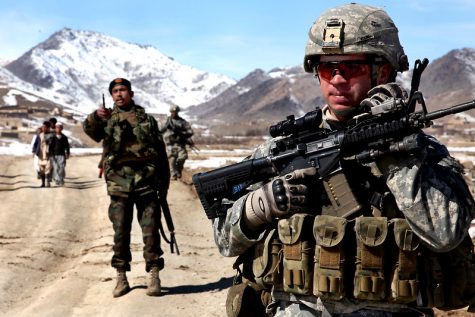
The controversy behind Afghanistan
Community members share their opinions on the US leaving Afghanistan
The war on Afghanistan came to an end on Aug. 30 when President Joe Biden ordered the complete withdrawal of American troops from the war-torn country. The 20-year war led to the deaths of more than 71,000 Afghan and Pakistani civilians since it began in 2001.
Biden’s decision in April to advance the troop withdrawal deadline from Sept. 11 to Aug. 31 was received with bipartisan support. History teacher Robbie Hoffman also believed it was a logical move on the president’s part.
“[We] can’t stay [in Afghanistan] forever,” Hoffman said. “[The news] always puts up the dollar sign on how much it costs to fight this war [and how it’s] the longest war that we have essentially been a part of, so there should be a time where you have to back out and turn over the country to its own people.”
As the withdrawal proceeded, the Taliban — an opposing militia-based government that ruled Afghanistan in 1996 and was eventually driven out by U.S. troops in 2001 — began its resurgence.
By early June, the Taliban had already toppled nearly 70% of rural Afghanistan, rapidly approaching the capital of Kabul. Less than two months later, on Aug. 15, Afghanistan’s preceding president, Ashraf Ghani, reportedly fled to Uzbekistan, cementing the Taliban’s regime as they then penetrated Kabul’s walls, gaining control of the outposts and making their way into the inner city.

When Afghanistan was previously under the Taliban regime, violence was rampant and oppression, especially against women, dominated Afghan life. Despite the impending danger the Taliban’s resurgence posed to Afghan citizens, Biden refused to extend the withdrawal deadline. Social science teacher Bonnie Belshe, initially supporting Biden’s decision to withdraw, began feeling more hesitant as the evacuation began to unfold.
“We still have a responsibility to Afghan citizens who need our help and support,” Belshe said. “That does not, I think, necessarily mean troops in Afghanistan, but rather, immigration programs and help and evacuation. I think the international community at large, not just the U.S., [needs to be] looking at ways to put pressure on the Taliban for human rights, particularly for rights for young women and women in Afghanistan.”
Biden initially expected the Afghan National Security — a U.S. backed organization that received 83 billion dollars in funding and whose members were trained by the U.S. — to maintain and defend their country. But as cities began falling to the Taliban, Biden recalled that his assumptions “that the Afghan government would be able to hold on for a period of time beyond military drawdown turned out not to be accurate.”
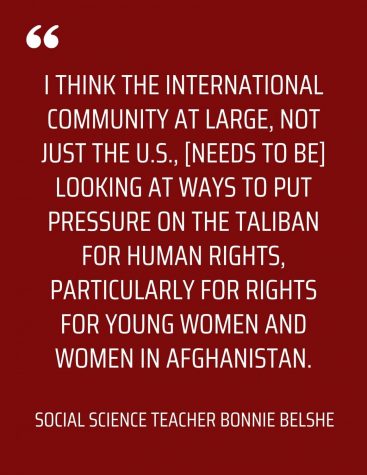
Biden’s miscalculation coupled with the Taliban’s resurgence sent a shockwave through the U.S., sparking public backlash and critics who denounced Biden for his poor execution; some even believe he should be impeached for how he handled the crisis. Hoffman, however, thinks that the blame shouldn’t be pinned on Biden.
“In Joe Biden’s defense, he didn’t initially start this war — it was something that he inherited, similar to Richard Nixon and the Vietnam War,” Hoffman said. “They didn’t start it, they were just the person there at the end.”
President George W. Bush led the initial invasion of Afghanistan, also known as Operation Iraqi Freedom, in an attempt to capture Al Qaueda, the terrorist group behind the 9/11 attacks. Even after the military assassinated the leader of Al-Qaeda Osama Bin Laden in 2011, under Obama’s presidency, the U.S. decided to stay in Afghanistan. It deployed troops and sent officials with the intention of democratizing the nation. Sustained and continuously subsidized by Bush’s successors — Barack Obama and Donald Trump — the American military presence, dubbed the “War on Terror” went on for 20 years. Junior Andrew Smithwick believes that “Biden finally pulled out [of the war], so if anything I think Biden’s the least to blame.”
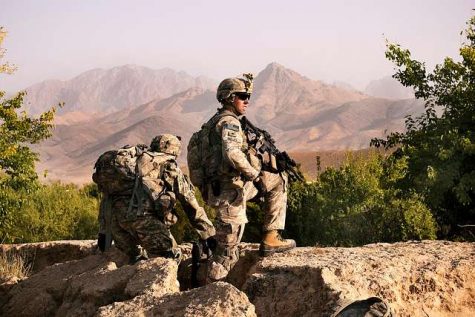
Afghanistan, however, fits into a larger picture depicting America’s overarching goal of a global regime change. Focused on spreading democratic ideologies, the U.S. has involved itself in the development of multiple countries such as Vietnam in Asia and Iraq in the Middle East, reforming the countries and instituting a U.S.-friendly government at the top.
“Some people around the world believe that the United States is sticking their noses where they don’t belong,” Hoffman said.
The wars in Vietnam, Iraq and Iran are three separate pieces of the U.S.’s ideological puzzle. Although they had different lifespans, they started and ended the same way, with the intent of implementing democracy to America’s eventual exit of the country, leaving it to run by itself.
On Aug. 31, Afghanistan, once again under the Taliban, joined the puzzle, starting a new legacy for itself — one without the U.S.
Who are the Taliban
Examining the past, present and future of the Taliban after the U.S. withdrew from Afghanistan after 20 years
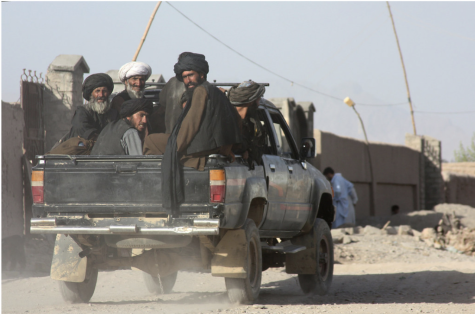
On Sept. 18, 2001, following the events of 9/11, President George Bush authorized force to apprehend the responsible parties and combat terrorism. Invading Afghanistan was one of the major measures the U.S. took to reach its goal.
After the assassination of Osama Bin Laden, the leader of Al Qaeda, the group that executed of the 9/11 attacks, the U.S. focused its efforts on the reconstruction of Afghanistan and “nation-building,”, which included creating peace and stability in the country in addition to championing social issues such as advancing women’s rights. Twenty years later President Biden decided to withdraw U.S. forces from Afghanistan, with the last soldiers leaving on Aug. 30, 2021.
However, groups such as ISIS (Islamic State of Iraq and the Levant), Al- Qaeda, and the Taliban, remain in Afghanistan. The Taliban currently hold immense power. Following the capturing of all but two of Afghanistan’s provincial capitals and the seizing two border crossings, several Taliban fighters overran the Kubal government. Despite the rapid advances of the Taliban, President Biden defended the withdrawal.
English Teacher Vennessa Nava, however, has concerns for the people who remain in Afghanistan with the increased power of the Taliban.
“[The Taliban is] a terrorist organization that has imposed extreme limits on people in Afghanistan and beyond in terms of human rights, women’s rights, LGBTQ rights,” Nava said. “They’re a theocratic kind of organization who imposes or enforces their own religious belief on the other people under their control…. Hearing what they said last week about how all women should stay home because their representatives aren’t yet trained to be able to handle women out in public — I’m very concerned for the Afghan people.”
The organization was formed in the 1990s by a group of students in Kandahar. The students were unhappy with the lack of enforcement of Islamic law after the collapse of the communist regime. But Foothill College Political Science Professor Kerri Ryer traces terrorist organizations like the Taliban to even earlier.
“Following the end of WWII and the creation of Israel, Osama bin Laden formed Al-Qaeda in response to the violence inflicted upon the Palestinians,” Ryer said in an email. “Their goal is to make the U.S. self-implode using terrorist tactics. It is also important to note that the Taliban were rural tribespeople, who were quite poor and lived off the land. Members of Al-Qaeda were/are much more urban and richer, and they view the Taliban as barbaric.”
At the beginning of the war in Afghanistan, the Taliban retreated and collapsed in December of. 2001, early into the invasion of Afghanistan by the U.S. Later, the former Taliban commander at the time, Mullah Dadhullah, was assassinated in an effort by U.S. and Afghan forces as a part of the reconstruction efforts of Afghanistan.
Peace talks with the Taliban resumed in 2020, the U.S. and the Taliban leaders signed a peace treaty. However, Ryer explains that despite the unstable history with the Taliban, the U.S, signing a peace treaty may have been the U.S.’s only option.
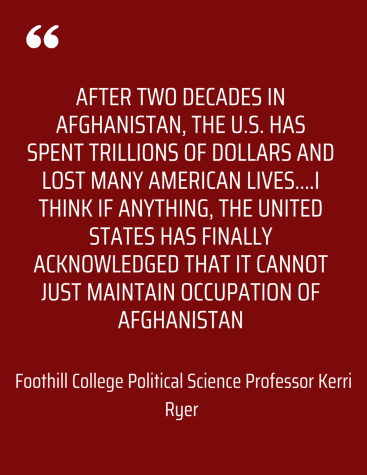
“Declaring war against things like terrorism, or drugs, or poverty never end well,” Ryer said in an email. “After two decades in Afghanistan, the U.S. has spent trillions of dollars and lost many American lives. Fighting terrorism is a lost cause because it requires fighting an enemy it cannot permanently erase and thus it is unending. I think if anything, the United States has finally acknowledged that it cannot just maintain occupation of Afghanistan.”
However, similar to Nava, senior Sriya Vennam believes the decision to withdraw puts the people who remain in Afghanistan at risk.
“I feel like Biden knew that [the withdrawal] would cause confusion,” Vennam said. “The deadline that he put was really close to when they evacuated. ….I feel like the people in Afghanistan [who are] still there are going to have to follow Sharia Law, which is what the Taliban are going to enforce.”
Technology has increased the reach of groups like the Taliban, allowing them to pose a greater threat. Although Professor Ryer believes that the Taliban is a threat, she says other groups such as ISIS are more dangerous and willing to use violence and theorize about the future for Afghanistan.
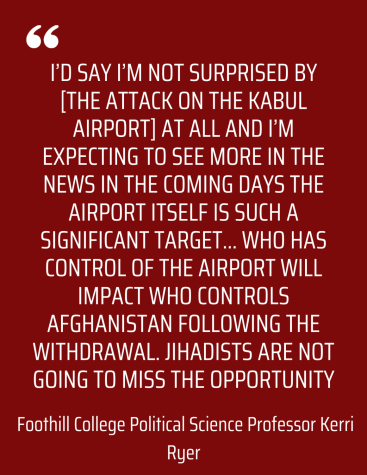
“Now that the U.S. is out of Afghanistan, the state is vulnerable to another civil war as these three groups — the Taliban, Al-Qaeda, and ISIS — will fight each other for power and control,” Ryer said in an email. “It just demonstrates that either the Taliban have failed to get ISIS under its control, or that they have negotiated deals with them that are in direct conflict with the agreement they made with the United States.”
Consequences have already emerged, with an ISIS attack on the Kabul airport in which 13 U.S. service members and 60 Afghan citizens were killed. Ryer commented about how, in the future, women’s education and rights and to LGBTQ+ rights may be jeopardized.
“I would expect the Taliban to enforce a strict adherence to Sharia law and ‘punish’ anyone who assisted the ‘infidels,’” Ryer said in an email. “I’d say I’m not surprised by [the attack on the Kabul Airport] at all and I’m expecting to see more in the news in the coming days the airport itself is such a significant target, not just as a symbol and location of the West, but strategically —who has control of the airport will impact who controls Afghanistan following the withdrawal. Jihadists are not going to miss the opportunity.”
